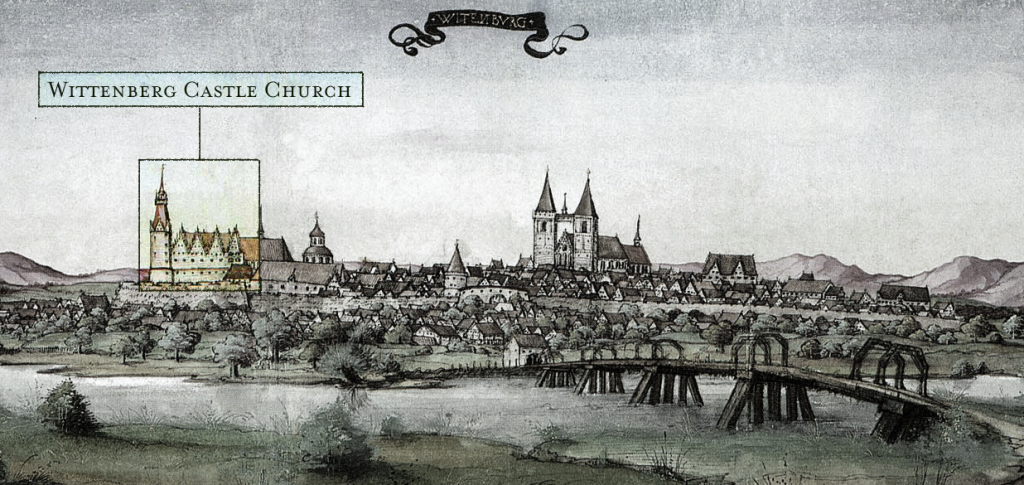Martin Luther
Preaches at Wittemberg

hortly after his conversion, he contacted John Staupitz and communicated his recent conversion. Luther had a deep desire to freely give to others what he was just given. Staupitz arranged for Luther to be consecrated as a priest and the vicar-general encouraged him to preach and travel to other parishes proclaiming the Truth of Jesus Christ. Toward the end of 1508, Staupitz mentioned Luther to The Elector Fredrick, and invited him to become a professor at the University of Wittemberg. The University was founded in 1502 by Fredrick the Wise, Elector of Germany, and it would become the home of Luther and the cradle of the Reformation.
Luther was appointed to teach philosophy and he began his serious study of the ancient languages of Scripture, Hebrew and Greek. Luther was also appointed to lecture on the Bible everyday, a rare thing in those days, in which the pupils and professors gained insight into the Word of God. He was teaching on the book of Romans, and in his personal study, read the words of the 17th verse of the first chapter, “The just shall live by faith.” These words took hold of him, revealing the mystery of the Christian life. His teachings proclaimed this truth unlike any other. His lectures were like no other had taught before. He was a Christian, revealing the Truth of Jesus. News spread of this preacher in Wittemberg and attracted a great number of students to the University. It was pronounced by Mellerstadt, another professor at the University, that “This monk,” said he, “will send all the doctors to the right about. He will introduce a new doctrine, and reform the whole Church, for he founds upon the Word of God; and no man in the world can either combat or overthrow this Word.”
Staupitz then invited Luther to preach at the Church of the Augustins, a small chapel in the middle of the public square of Wittemberg. In a short time, the little chapel could not contain the hearers who crowded in. In 1510, the Council of Wittemberg had then made their choice of Luther for their preacher and thus, the Reformation commenced. Luther was teaching at both the academic chair of Wittemberg and the Church continually attracting people to hear the Truth.
For the next seven years, Luther would advance in his studies and knowledge of the Word, groomed by the Holy Spirit to be the leader of the Reformation. It was during this time he traveled to Rome. Dreaming of seeing holiness, for he still had great respect of the Pope and the Catholic Church, he was greatly disappointed to see firsthand the corruption of the papal see and the Roman Catholic organization. He affirmed that the corruption of the world was occasioned by the priests, who, instead of preaching the pure Word of God, taught so many fables and traditions.
During this time, he grew in the knowledge of the forgiveness of sins and of the righteousness of faith. He communicated with the two great scholars of that age, Erasmus and Reuchlin. The former, as discussed earlier, being the founder of the printed Greek New Testament, and the latter being the great scholar of the Hebrew language, enabling many to learn the language of the Old Testament. He also worked with the Elector Fredrick and the Elector’s secretary and chaplain, George Spalatin, who would both become major advocates in the Reformation.
Staupitz then invited Luther to preach at the Church of the Augustins, a small chapel in the middle of the public square of Wittemberg. In a short time, the little chapel could not contain the hearers who crowded in. In 1510, the Council of Wittemberg had then made their choice of Luther for their preacher and thus, the Reformation commenced. Luther was teaching at both the academic chair of Wittemberg and the Church continually attracting people to hear the Truth.
For the next seven years, Luther would advance in his studies and knowledge of the Word, groomed by the Holy Spirit to be the leader of the Reformation. It was during this time he traveled to Rome. Dreaming of seeing holiness, for he still had great respect of the Pope and the Catholic Church, he was greatly disappointed to see firsthand the corruption of the papal see and the Roman Catholic organization. He affirmed that the corruption of the world was occasioned by the priests, who, instead of preaching the pure Word of God, taught so many fables and traditions.
During this time, he grew in the knowledge of the forgiveness of sins and of the righteousness of faith. He communicated with the two great scholars of that age, Erasmus and Reuchlin. The former, as discussed earlier, being the founder of the printed Greek New Testament, and the latter being the great scholar of the Hebrew language, enabling many to learn the language of the Old Testament. He also worked with the Elector Fredrick and the Elector’s secretary and chaplain, George Spalatin, who would both become major advocates in the Reformation.
